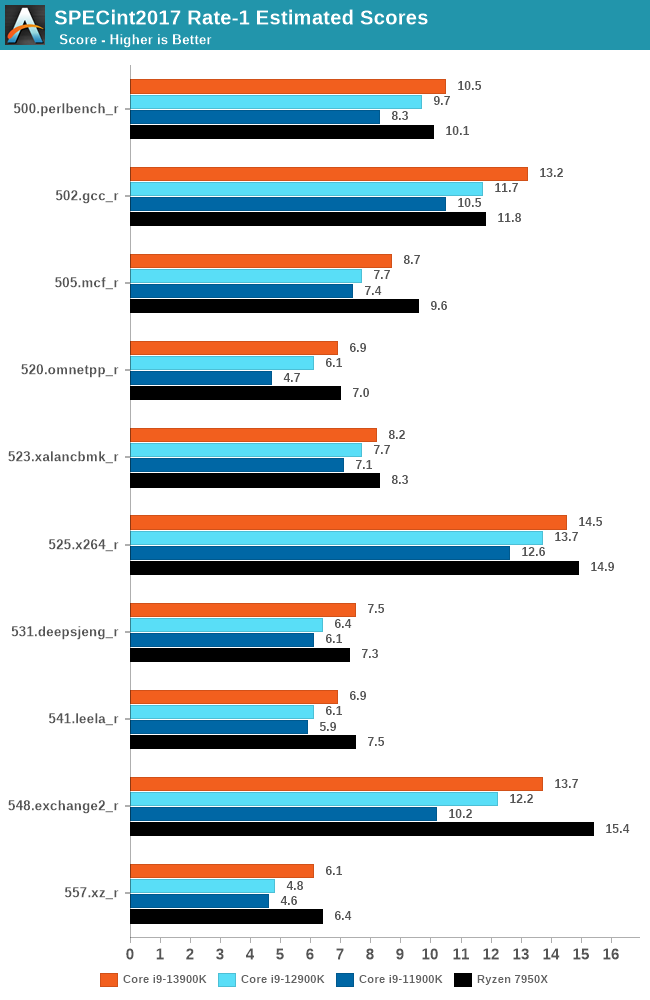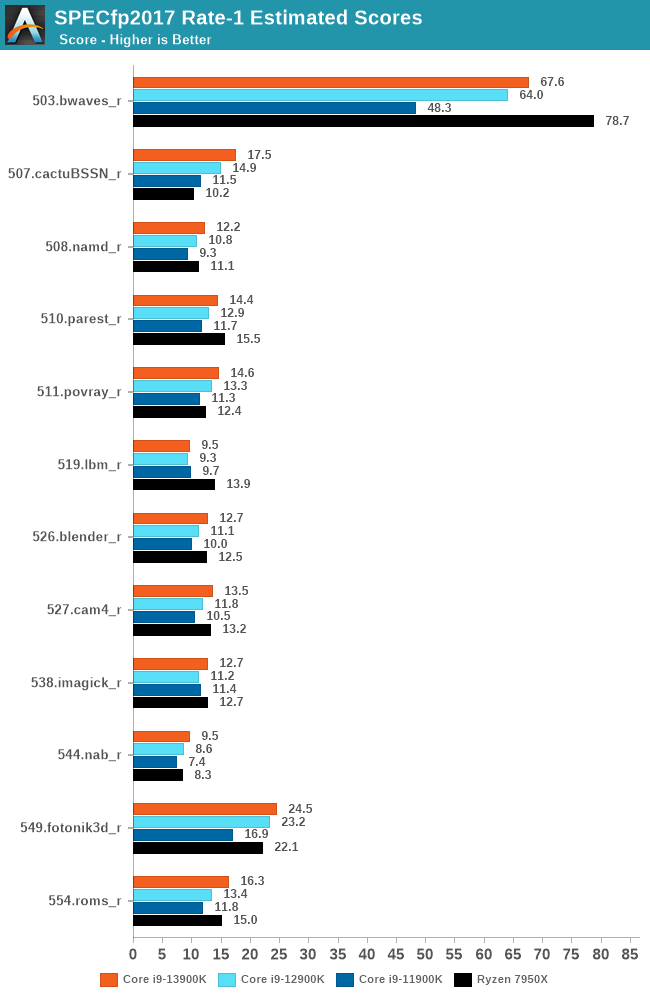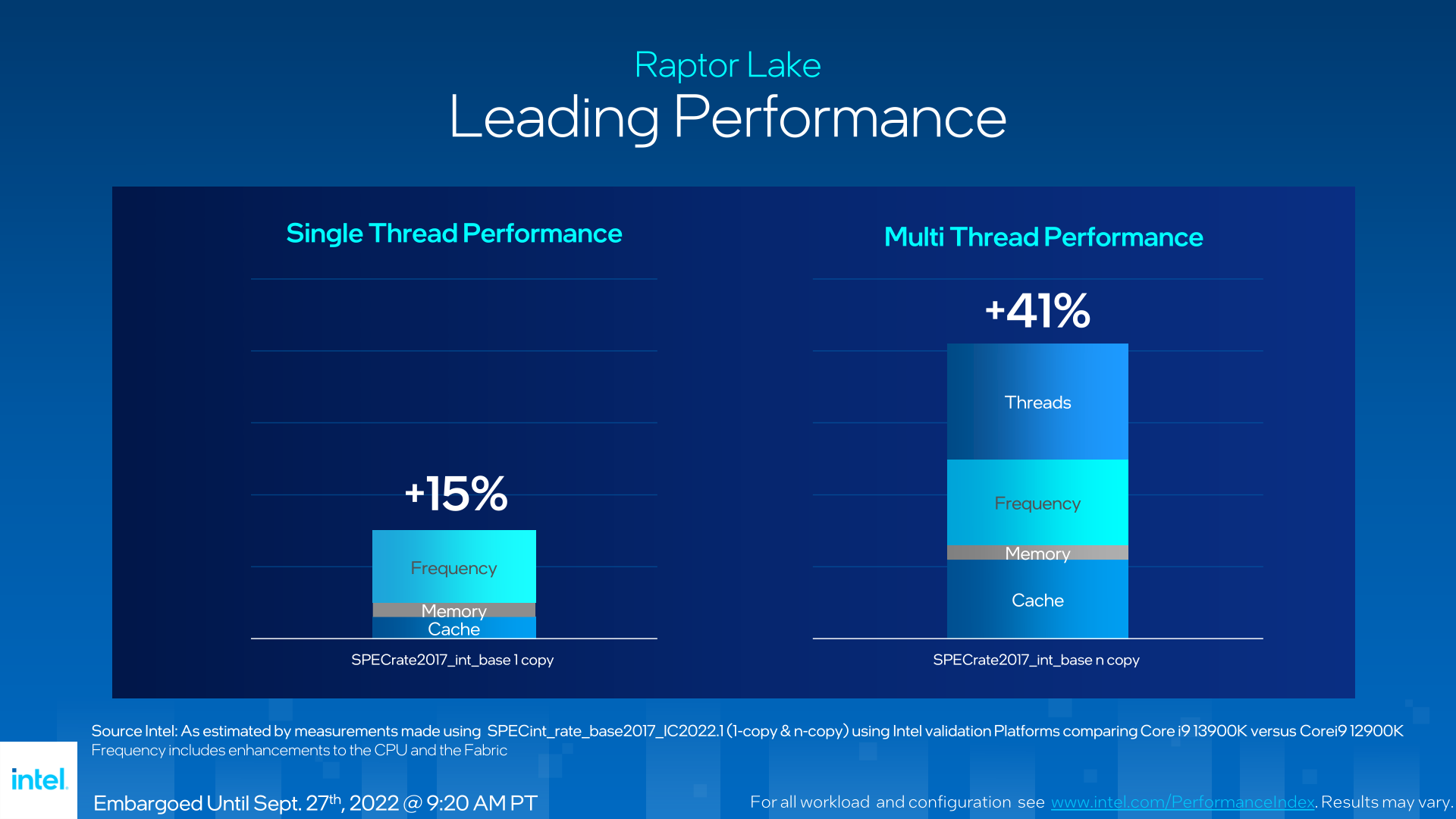Intel Core i9-13900K and i5-13600K Review: Raptor Lake Brings More Bite
by Gavin Bonshor on October 20, 2022 9:00 AM ESTSPEC2017 Single-Threaded Results
SPEC2017 is a series of standardized tests used to probe the overall performance between different systems, different architectures, different microarchitectures, and setups. The code has to be compiled, and then the results can be submitted to an online database for comparison. It covers a range of integer and floating point workloads, and can be very optimized for each CPU, so it is important to check how the benchmarks are being compiled and run.
We run the tests in a harness built through Windows Subsystem for Linux, developed by Andrei Frumusanu. WSL has some odd quirks, with one test not running due to a WSL fixed stack size, but for like-for-like testing it is good enough. Because our scores aren’t official submissions, as per SPEC guidelines we have to declare them as internal estimates on our part.
For compilers, we use LLVM both for C/C++ and Fortan tests, and for Fortran we’re using the Flang compiler. The rationale of using LLVM over GCC is better cross-platform comparisons to platforms that have only have LLVM support and future articles where we’ll investigate this aspect more. We’re not considering closed-source compilers such as MSVC or ICC.
clang version 10.0.0
clang version 7.0.1 (ssh://git@github.com/flang-compiler/flang-driver.git
24bd54da5c41af04838bbe7b68f830840d47fc03)
-Ofast -fomit-frame-pointer
-march=x86-64
-mtune=core-avx2
-mfma -mavx -mavx2
Our compiler flags are straightforward, with basic –Ofast and relevant ISA switches to allow for AVX2 instructions.
To note, the requirements for the SPEC licence state that any benchmark results from SPEC have to be labeled ‘estimated’ until they are verified on the SPEC website as a meaningful representation of the expected performance. This is most often done by the big companies and OEMs to showcase performance to customers, however is quite over the top for what we do as reviewers.

Opening things up with SPECint2017 single-threaded performance, it's clear that Intel has improved ST performance for Raptor Lake on generation-upon-generation basis. Because the Raptor Cove P-cores used here don't deliver significant IPC gains, these performance gains are primarily being driven by the chip's higher frequency. In particular, Intel has made notable progress in improving their v/f curve, which allows Intel to squeeze out more raw frequency.
And this is something Intel's own data backs up, with one of Intel's performance breakdown slides showing that the bulk of the gains are due to frequency, while improved memory speeds and the larger caches only making small contributions.
The ST performance itself in SPECint2017 is marginally better going from Alder Lake to Raptor Lake, but these differences can certainly be explained by the improvements as highlighted above. What's interesting is the performance gap between the Core i9-13900K and the Ryzen 9 7950X isn't as far apart as it was with Alder Lake vs. Ryzen 9 5950X. In 500.perlbench_r, the Raptor Lake chip actually outperforms the Zen 4 variant by just under 4%, while Ryzen 9 7950X is a smidgen over 10% better in the 505.mcf_r test.

Looking at the second set of SPEC2017 results (fp), the Ryzen 9 7950X is ahead of the Core i9-13900K by 16% in the 503.bwaves_r test, while the Raptor Lake chip is just under 10% better off in the 508.namd_r test. The key points to digest here is that Intel has done well to bridge the gap in single-threaded performance to Ryzen 7000 in most of the tests, and overall, it's a consistent trade-off between which test favors which mixture of architecture, frequency, and most importantly of all, IPC performance.
While we highlighted in our AMD Ryzen 9 7950X processor review, which at the time of publishing was the clear leader in single-core performance, it seems as though Intel's Raptor Lake is biting at the heels of the new Zen 4-core. In some instances, it's actually ahead, but stiff competition from elsewhere is always good as competition creates innovation.
With Raptor Lake being more of a transitional and enhanced core design that Intel's worked with before (Alder Lake), it remains to be seen what the future of 2023 holds for Intel's advancement in IPC and single-threaded performance. Right now, however SPEC paints a picture where it's pretty much neck and neck between Raptor Cove and Zen 4.











169 Comments
View All Comments
blppt - Monday, October 24, 2022 - link
Wow, what is going on with Civ 5 and Intel 12/13 series CPUs? They get absolutely wrecked. Replyshoestring - Tuesday, October 25, 2022 - link
"...eeking out every last bit of performance" +1 for word choice, -1 for the spelling: it's actually "eking", which looks weird to me too! https://www.dictionary.com/browse/eke ReplyRyan Smith - Tuesday, October 25, 2022 - link
You are correct. The article has been fixed.I humbly accept my deduction in points. Thank you for bringing it to my attention. Reply
OreoCookie - Tuesday, October 25, 2022 - link
I am surprised Gavin did not include the cooler and perhaps beefier power supply in the price comparison: clearly, if you get an Intel system, you need a *much* bigger cooler, especially if you care about noise. And you might need a bigger power supply, especially if you plan on getting an nVidia 4000-series card. Replynader_21007 - Wednesday, November 2, 2022 - link
THX for the review.It should be mentioned that INTEL's 13900K is nowhere near the MSRP of $589, I expect the writer to check the real prices, it's price is $795, about $100 more than AMD's ryzen 7950X.
AMD CPU's are cheaper. it's FACT. Reply
SanX - Wednesday, November 9, 2022 - link
I do not need your bs E cores in desktop, Intel ReplySantoval - Tuesday, November 22, 2022 - link
I wonder if the 5.8 GHz turbo is going to last more than 1 nanosecond at a time. ReplyVVTF - Tuesday, October 17, 2023 - link
The sad thing is, I find this Alder Lake-N review for Nuc Boxes on Anadtech much more interesting:https://www.anandtech.com/show/21085/asrock-indust... Reply